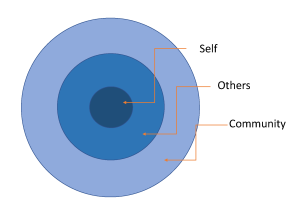2 Family Leadership Training Initiative
In 2015, momentum was building among family leaders across the country to train families of Children and Youth with Special Health Care Needs in leadership and advocacy skills. While parents and caregivers have significant life experience in the world of special needs, they may not have the training to partner with professionals at all levels. Family leadership training increases the capacity of caregivers to communicate better with providers, work with community partners, and make health care systems more family-centered. In March 2016, a group of CHSC Family Navigators launched the inaugural session of this training.
In many ways, staff report just trying some things to see what would stick!

The training was nine month long, mostly virtual one-hour trainings with one in-person session. The Maternal and Child Health Leadership Competencies[1] from the federal bureau served as the framework. Sessions were presentations by national and state leaders.
Thirty-five parents and grandparents from all areas of Iowa applied- 25 were accepted. Small group mentoring from seasoned family leaders was provided. Participants completed Individual Leadership Projects as part of the training.
A post-training evaluation revealed the need for improvement in these areas.
• Clarification of desired outcomes
• Definition of target audience
• Training format
• Role of mentors
• Community Service Project
Technical Assistance
CHSC staff applied for and received technical assistance funding from the Health Resources and Services Administration (HRSA) to work with Librada Estrada Consulting, an organization specializing in professional coaching and facilitation. Over a period of six months, CHSC staff worked with Ms. Estrada to review and revise the training curriculum based on several lessons learned.
New objectives were developed for the training program:
1. Understand how to work with partners
2. Become aware of one’s own path to leadership
3. Discover strategies for advocacy
4. Prepare a Community Service Project having impact at the community or systems level
The mission was defined as the preparation of emerging family leaders to engage in advocacy at all levels (individual, community and systems) to improve policies and services for Iowa children with special health care needs and their families.
The Maternal and Child Health Leadership Competencies were used as a framework for developing these the new objectives. Figure 1 illustrates with widening spheres of influence that leaders experience as they develop from self to others to the wider community

The leadership process begins with the focus on self where leadership is directed at one’s own learning. Leadership in the next sphere extends to others as they are influenced and possibly altered through interactions with the individual. Leadership can also extend to a broader impact through additional skills and a broader based understanding of the change process.
CHSC staff worked with Ms. Estrada to identify the “ideal participant” for the training, solidifying a target audience. It was understood that not all applicants should be accepted into the program. Staff looked for individuals who had some involvement with previous training or with a disability-specific organization, had a desire to develop their leadership skills and grow through mentorship, and were relatively settled in their family life. Applicants were asked to provide two references, complete a screening questionnaire and participate in an interview with staff. Training staff rated each candidate using a scale from one to five, recognizing that defining readiness led to a stronger cohort. The ideal cohort size, 12-15 trainees, was established.
After consultation with the Massachusetts CYSHCN program, the training format was changed from virtual to in-person, including an overnight stay. This resulted in more contact hours and opportunities for trainees to interact and socialize with one another outside of the structured training sessions. To reduce the need to travel long distances, participation was limited to individuals from a specific region of the state and the format was changed to four sessions over four months.
Staff also decided to engage local experts rather than national speakers for the 2017 session. CHSC Family Navigators were recruited to develop and deliver trainings along with partners from the University of Iowa and community organizations. The Maternal and Child Health Leadership Competencies framework was retained with emphasis on interactive sessions.
During the 2016 session, there were only five mentors for 25 participants. In the revised training, the number of participants was reduced in order to provide one-to-one mentoring. Guidelines were developed to further define the role of mentors, who were selected based on their experience as parents of CYSHCN and as advocates at the state or national level. Mentors were asked to help participants with the development of their Community Service Project and were required to be in regular contact between training sessions.
The name of the final project was changed from Individual Leadership Project to Community Service Project. During the 2016 session, several trainees had goals that were unattainable or overly ambitious and some projects didn’t meet the community impact criteria. The guidelines for this project were revised to help trainees identify realistic goals. A series of worksheets were developed to help participants identify specific timelines, interact with their peers, and provide feedback to the trainers. Participants were encouraged to think about the impact of their project at the community or systems level and to engage other community partners. A protocol was developed for trainees who were either not meeting the expectations of the Community Service Project and/or the required contact hours with their mentor.
A LookBook of all Community Service Projects to date is available in the appendix.
- The Maternal & Child Health Bureau (MCHB) strengthens public health systems to meet the needs of America's mothers, children, and their families. It serves as part of the federal Health Resources & Services Administration (HRSA). ↵
